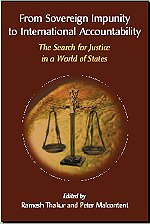| UNU Home UNUP Home Publications Staff Feedback Search Contacts Disclaimer | ||
|
From Sovereign Impunity to International Accountability: The Search for Justice in a World of States
Edited by Ramesh Thakur and Peter Malcontent |

|
| ||||||||||||||||||
| |||||||||||||||||||
Description
“The last century has seen the role of law and justice in governance extend beyond the realm of individual nations. Its significance, both regionally and globally, is illustrated by the developments made in international law, especially with regard to the recognition of international human rights, universal jurisdiction and additional international crimes. However, the significant advances with regard to the international recognition of humanitarian law and the ending of impunity for war criminals stand in real danger of being reversed
- From the Foreword by Justice Richard J. Goldstone
“One of the functions of criminal law is to serve as a collective memory of past injustice. A criminal trial brings past suffering into public knowledge. It may thus enable a victimized community to deal with trauma and, perhaps, to create the conditions of future social life. But recording past injustice and creating the conditions of national reconciliation are not always best realized through criminal law. Evidence available, even of massive violations, may not always fulfill the formal criteria for criminal accountability. The way from the opening of a mass grave to proving a political leader responsible is long and complex, and success is by no means ensured. In cases like this, a criminal trial may not always provide the best instrument for memory and healing - especially if the leader must be released because of the lack of formal evidence. On the other hand, if releasing the leader is excluded at the outset, then the legitimacy of the trial may be questioned...
From Sovereign Impunity to International Accountability confronts these and other challenges by exploring the changing political and human rights context that gave rise to the international norm of individual criminal accountability. It brings together a preeminent group of experts to explore the progress, scope and controversies of international accountability.
Editors
- From the Preface by Martti Ahtisaari
Ramesh Thakur is the Senior Vice-Rector of the United Nations University, Tokyo. Peter Malcontent is a researcher and lecturer at the Netherlands Institute of Human Rights (SIM), Utrecht University, Utrecht.
 UNU home
UNU home